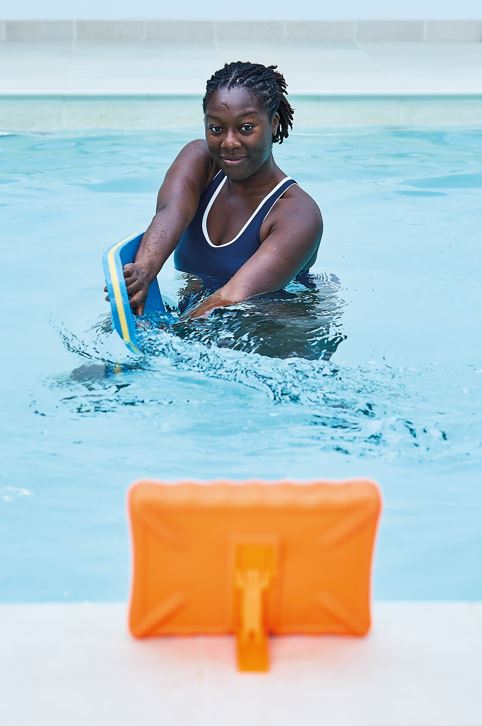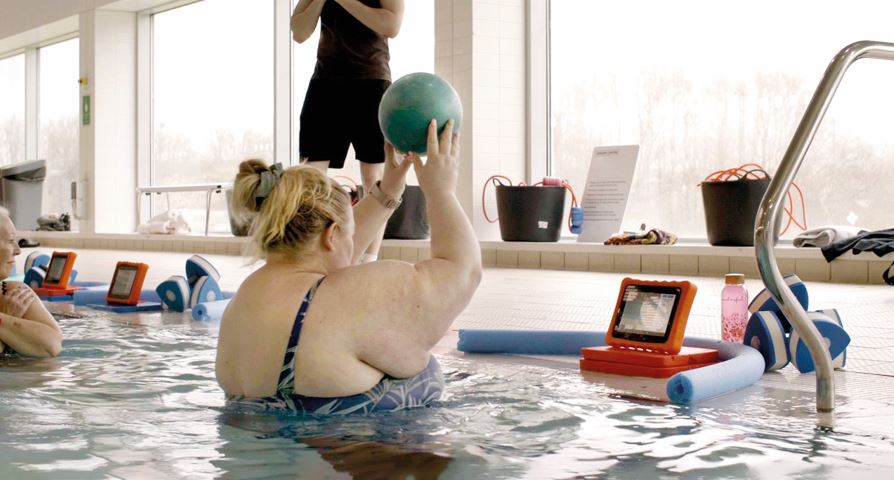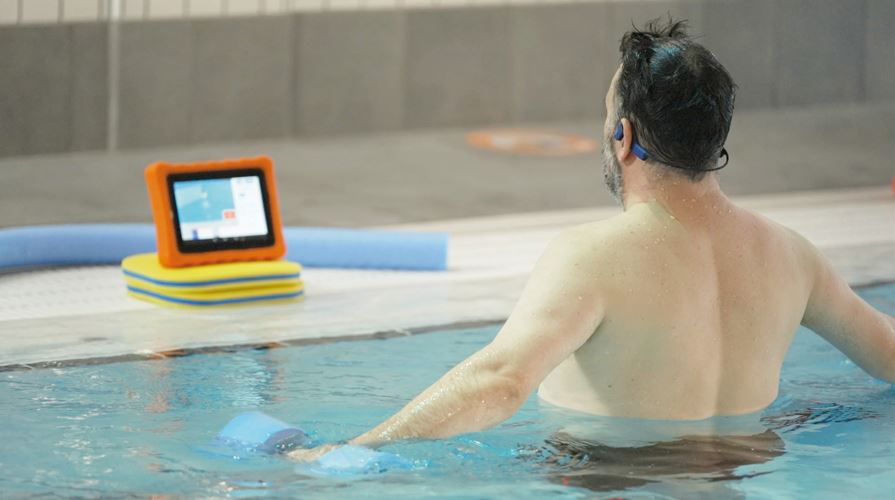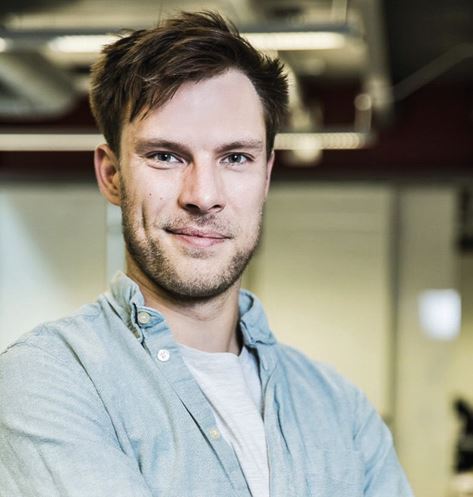
We talk to Ben Wilkins, chief executive of mission-driven organisation, Good Boost, about how its model of community-based therapeutic exercise and wellbeing programmes could help transform leisure centres into ‘health and wellbeing hubs’ and create new revenues and members at the same time as relieving pressure on health services.
Over the last 18-months Good Boost has been leading a multi-partner, UK Research & Innovation (UKRI) project called ‘MSK Hubs’ to create the services and pathways for people living with MSK conditions to have options for supported-self management in their local leisure centre.
Musculoskeletal (MSK) conditions affect more than 20 million people in the UK and account for the third-largest area of NHS spend – at £5billion a year – with regular news reports of patients facing long waits for treatment and rehabilitation.
And, over the past year, pilot leisure venues across the nation have launched at ‘MSK hubs’, which shift these services from hospitals and health centres to community leisure facilities.
Parkwood Leisure, Legacy Leisure, and Lex Leisure recently announced the launch of new MSK rehabilitation programmes at 24 leisure centres in England and Wales, creating new community MSK self-management capacity and helping to improve access for people living with joint and pain conditions.
This is part of a two-year industrial research project led by a health and fitness consortium comprising Good Boost, ukactive, Orthopaedic Research UK, ESCAPE-pain, and Arthritis Action.
Good Boost is an aqua and land-based exercise rehabilitation programme that uses AI technology to assess individual conditions, needs, and requirements to create individually-tailored therapeutic-exercise programmes.
The technology enables both individual and group sessions, with a high emphasis around the social and emotional support offered in group classes, while enabling individuals to benefit from a personalised exercise plan.
A community focus
The concept for Good Boost was developed by Ben Wilkins, who, despite embarking on a degree in osteopathy, soon realised that, rather than one-to-one clinical practice in therapy clinics, he was more interested in a community-wide approach to improving the health and wellbeing of villages, towns, cities, and nations.
After finishing his degree, he worked for charities and social enterprises in Oxford and London and was able to see first-hand what communities were doing to address issues such as homelessness, drug and alcohol addiction, and the physical health needs of local people.
He later took a MSc qualification in musculoskeletal science at the University of Oxford, and so began a career that would both fulfil his aim of helping to improve people’s health and wellbeing and create a new blueprint for how the leisure and health sectors can work in tandem to improve outcomes and quality of life for millions of people.
“I was reviewing the research and completing my own research and I realised there was the evidence for therapeutic aquatic exercise and aqua rehab, but often a gap in the provision of pool-based rehab services despite patient demand, in addition to a need for more options for community rehabilitation, particularly in existing community spaces and public swimming pools,” he said.
“Hydrotherapy pools, both public and private, can have limited access due to patient needs and greater demand than the space available.”
Fulfilling a need
Ben started working with social enterprise, Oomph, and was set the task of setting up an exercise service for older adults in sheltered housing and care facilities.
“It was brilliant to have the opportunity to learn from some incredibly-talented team members at Oomph how to co-design, develop, and deploy products and services for ‘active ageing’, and how to take a concept through to a sustainable service, both in terms of finance and impact,” he recalls.
“While working at Oomph in London, I continued to visit Oxford for my MSc and met people who would tell me they had an operation coming up, or an injury, and had been told to exercise, but did not know what to do, as they had been recommended ‘squats’, but struggled to walk, let alone squat!
“At the end of my MSc I had started the concepts and pilot for Good Boost because I wanted to create something tangible and I could see there was a need.” At the beginning, Good Boost was a small pilot in a swimming pool in Oxford, with no technology, just using the home-made laminated exercise cards made with the help of Ben’s physio and osteo connections. “At the end of the pilot, we asked people their views and looked at the pre and post outcomes and we could see that we were positively impacting people’s ability to manage their condition and the impact the condition had on their lives. Not just that, but they did not want to stop attending, and brought friends and family with them too,” he said.
Meeting individual needs
“We then managed to secure some social enterprise start-up funding and later an organisation offered us some pro-bono AI consultancy support. “Our next step was to digitise the home-made laminated exercise sheets – there were over 1,000 – and we provided participants with waterproof tablets, using AI to automate the process so we could tailor the exercise plans for specific abilities and preferences.” And the software was designed in collaboration with adults with low confidence when using technology, ensuring it is easy to use. Once a participant is signed up to Good Boost – which is supported by leisure centre staff and volunteers – they have an introductory session where they will answer a number of questions on the Good Boost waterproof tablets. They then meet the Good Boost facilitator and other participants. “We quickly realised that the key is not just the tailored exercises themselves,” said Ben. “It’s also the social and emotional support, which is a critical part of building confidence and trust for the first session and to keep people attending.
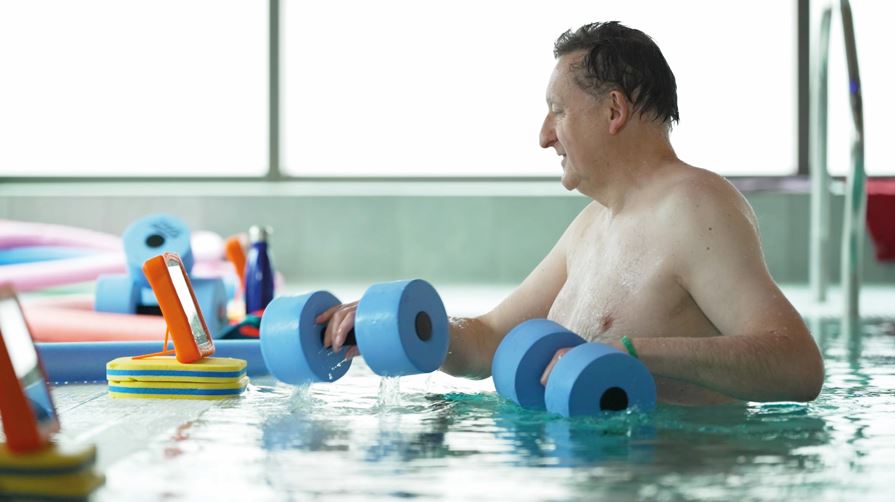
Supporting self management
“Good Boost classes are like no other exercise class. A more-traditional group exercise class will have music playing and you as the participant are having to follow the movements of the instructor. “We work tirelessly at Good Boost to design a system and service that is designed around having high-quality clinical governance and safety so that every participant has a programme that works for them, and the Good Boost facilitator, rather than focusing on what exercise to demonstrate or perform in front of a traditional group exercise class, can focus on having conversations, making people feel welcome, creating connections, and delivering that essential social and emotional support.” Ben’s original concept and unique approach has now earned interest from across the UK and overseas. “Larger leisure operators are working with us, with commitment to roll out Good Boost and we have committed support from Government to scale our growth and impact” he said. “Our approach is one that is proven to work and linking leisure and health services together is something I think we need to continue to do as there is an obvious link between health and wellbeing and physical activity which has previously been largely untapped.”
